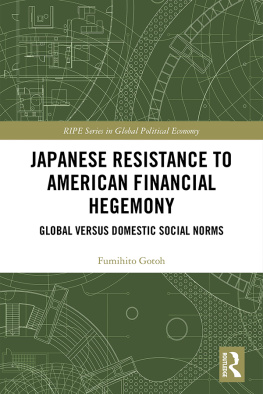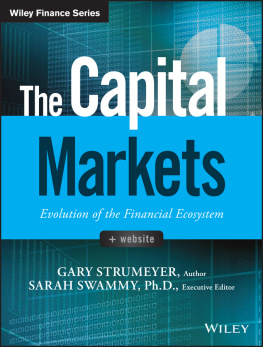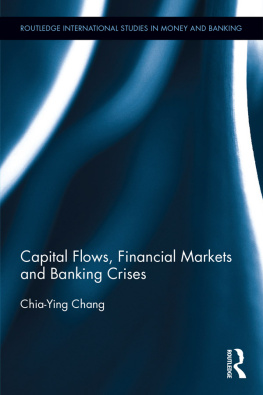CAPITAL MARKETS AND INSTITUTIONS IN BANGLADESH
To the memory of my mother, Fazilatennesa
First published 1997 by Ashgate Publishing
Reissued 2018 by Routledge
2 Park Square, Milton Park, Abingdon, Oxon OX14 4RN
711 Third Avenue, New York, NY 10017, USA
Routledge is an imprint of the Taylor & Francis Group, an informa business
Copyright M. Farid Ahmed 1997
All rights reserved. No part of this book may be reprinted or reproduced or utilised in any form or by any electronic, mechanical, or other means, now known or hereafter invented, including photocopying and recording, or in any information storage or retrieval system, without permission in writing from the publishers.
Notice:
Product or corporate names may be trademarks or registered trademarks, and are used only for identification and explanation without intent to infringe.
Publishers Note
The publisher has gone to great lengths to ensure the quality of this reprint but points out that some imperfections in the original copies may be apparent.
Disclaimer
The publisher has made every effort to trace copyright holders and welcomes correspondence from those they have been unable to contact.
A Library of Congress record exists under LC control number: 97061066
ISBN 13: 978-1-138-61162-7 (hbk)
ISBN 13: 978-0-429-44989-5 (ebk)
In the recent past rapid transformations of economic structure, policies and institutions are being observed on a global scale. More so in case of private sectors, financial markets and institutions, perhaps, because they are identified as crucial factors for sustainable economic growth and the achievement of national development goals in a freer market economy. Bangladesh also has witnessed remarkable macroeconomic stability, sweeping deregulation and liberalization over the past few years. Although economic underpinnings consistent with market economy and liberalization appear sufficient in general for the last few years, development of efficient and stable capital markets has not yet been attained. Substantial growth of a robust and vibrant market depends on overall environment, sound policy, legal and structural frameworks, promotional planning, as well as effective execution thereof. Making them all conducive for the rapid growth of the market is not an easy task. This study has made a modest attempt to explore a sensible approach to these issues rather than offer panacea solutions. In pursuing this objective, this study has focussed close attention on the experience of Japanese capital market development that has contributed significantly in the transformation process from a regulated economy to present-day economic superpower status along with the path of market economy. Thus, the implications of the Japanese corporate practices for developing countries are another aspect of this study based on theoretical and empirical analysis of both Bangladesh and Japanese markets. The conventional standard notions developed in Anglo-American countries constitute a strong foundation for the analysis of those markets, but they cannot give adequately convincing explanations of the Japanese financial system. Capital markets in Japan have experienced a radical structural change after World War II as a consequence of reforms introduced by the Occupation Authorities and the need to rebuild. Besides, Japanese capital markets have been evolving continuously since the War. Thus, the traditional practices have been adapted to a much more complex reality. To the extent our arguments are convincing, the results of the study are expected to indicate a somewhat different emphasis in the market development efforts of present-day developing countries like Bangladesh.
The completion of this book reflects the influence, encouragement and support of many individuals. Special mention of selected persons seems to me invidious as well as humiliating for them as that may relate them with my mistakes and naive judgements. However, the following inventory captures only the most obvious and important ones. As a graduate student at Yokohama National University and Nagoya University of Japan for the period from 1983 to 1989 and subsequently as a Professor affiliated jointly with Nagasaki University of Japan and Dhaka University of Bangladesh I had the opportunity to study and teach finance theory, Japanese and Bangladesh capital markets. The analysis and interpretations of this book are the results of my study and teaching on these areas. I have been in close touch with some insightful empirical studies on the recent Bangladesh financial system at Dhaka. Similarly, I have been exposed to a nice academic environment that promotes rigorous research activities at Nagasaki. This book could not have come out without the interactions with students, teachers and colleagues at all these institutions. I am deeply indebted to them for their inspiring discussions and critical comments.
I should record here the name of Professor Tamao Yamada of Chubu University, formerly of Nagoya University, Japan, who kindled my interest in finance theory and development finance and helped me to grow. I owe a great deal to Professor Shigeru Uchida and Professor Takafumi Yoshida who undertook the task of going through the earlier drafts. I am grateful for their advice and encouragement. I must acknowledge the wholehearted cooperation of Professor Akira Shimada who has provided much important information and responded spontaneously to my frequent requests for arranging logistic support necessary to complete this book. None of them, however, is responsible for errors and omissions. I consider it my pleasant duty to express my sincere gratitude to my wife Naherin and to my sons, Navin and Navid for their encouragement and support extended to me for completion of the book. Finally, I acknowledge the partial financial support by the Research Institute of South East Asia, Nagasaki University, for conducting this study.
M. Farid Ahmed
Nagasaki University
ABSs
Asset-Backed Securities
ADB
Asian Development Bank
AGM
Annual General Meeting
BB
Bangladesh Bank
BCI
Bangladesh Commerce and Investment Ltd.
BCIC
Bangladesh Chemical Industries Corporation
BJMC
Bangladesh Jute Mills Corporation
BKB
Bangladesh Krishi Bank
BMRE
Balancing, Modernization, Replacement and Expansion
BOGMC
Bangladesh Oil, Gas and Minerals Corporation
BOI
Board of Investment of Bangladesh
BOJ
Bank of Japan
BPC
Bangladesh Petroleum Corporation
BPDB
Bangladesh Power Development Board
BSB
Bangladesh Shilpa Bank
BSC
Bangladesh Shipping Corporation
BSEC
Bangladesh Steel and Engineering Corporation
BSFIC
Bangladesh Sugar and Food Industries Corporation
BSRS
Bangladesh Shilpa Rin Sangstha
BTMC
Bangladesh Textile Mills Corporation
BTTB
Bangladesh Telephone and Telegraph Board
CAPM
Capital Asset Pricing Model
CCI
Controller of Capital Issues
CDS
Central Depository System
CSE
Chittagong Stock Exchange











